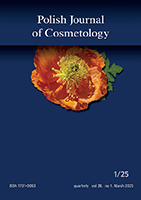search by
Copyright @ Pol J CosmetolKnowledge of tattoo studio workers in Silesia on health risks arising from body tattooing and piercingAgnieszka Korpak, Anna Rogalska, Aleksandra Żelazko, Joanna Domagalska, Przemysław Nowak Zakład Toksykologii i Ochrony Zdrowia w Środowisku Pracy, Katedra Toksykologii i Uzależnień Wydział Zdrowia Publicznego w Bytomiu, Śląski Uniwersytet Medyczny w Katowicach Summary Introduction. Tattooing or body piercing entails the risk associated with health hazards. The basic complications are among others infectious diseases, such as follows: hepatitis B and C, tuberculosis, HIV, and syphilis. Knowledge of prevention and the ways a given disease can be transmitted as well as proper hygienic behaviours of employees can minimize the risk of its infection. Aim. Evaluation of knowledge and awareness of tattoo studio employees on tattooing and body piercing related health risks. Material and methods. The questionnaire - based study was carried out among 65 tattoo studio employees - respondents or interviewees from Silesia. The questionnaire contained questions on general knowledge of infectious diseases one can become infected during a tattooing or body piercing surgery as well as issues that showed hygienic behaviours of the respondents. Results. The level of knowledge of tattoo studio workers on health risks is average. Only every fifth respondent has demonstrated a high level of knowledge on the subject. As for hygienic behaviours in most respondents they are at an average level as well. Conclusions. In the interviewed group of respondents the level of knowledge about the dangers connected with performing body tattooing and piercing surgeries is at an average level. No doubt did the interviewees find questions concerning ways of spreading major communicable diseases and their possible prevention methods difficult. Besides, hygienic behaviours of the respondents are not fully satisfactory, which may result from lack of regulations in the country as well as insufficient training courses of all employees concerned. Key words: tattoo studio, piercing, hygienic behaviours, infectious diseases |




